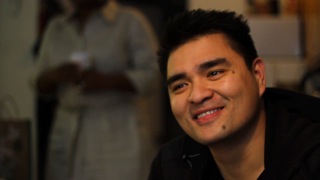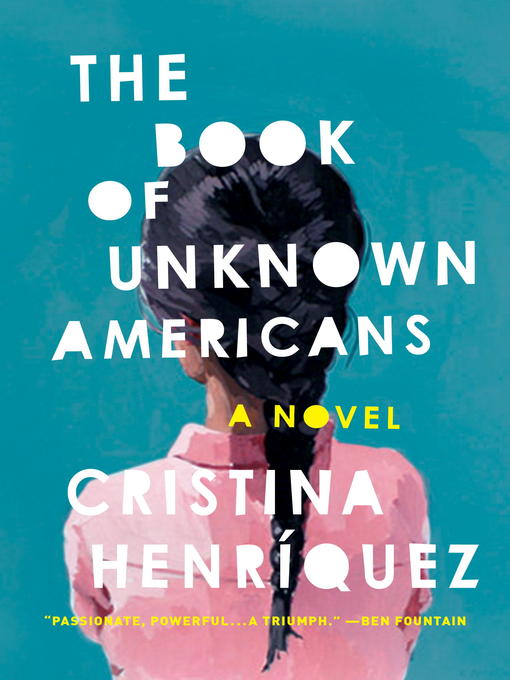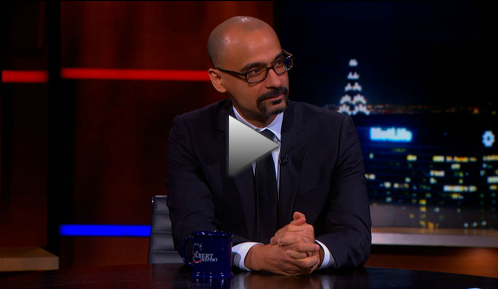The audience was sparse for immigration activist Jose Antonio Vargas. As it scattered into the seats of the Ohio Theatre in downtown Cleveland, some of the regulars for the Town Hall lecture series murmured about the empty rows.
Near the front of the ornate auditorium, a retired couple from Mentor, Ohio, scanned the program. “Hope the immigration service doesn’t show up and nab him,” the man said.
“Yeah,” his wife replied.
“Is an undocumented immigrant the same as an illegal alien?” he asked her.
“I don’t know,” she said, “it sounds that way.”
This preamble made an unnervingly apt set-up for an evening with Vargas, a frank, funny Philippines-born journalist who calls himself “a walking uncomfortable conversation.” Vargas generated headlines in 2011 when he wrote a New York Times Magazine piece called “My Life as an Undocumented Immigrant.”
Since then, Vargas has become the face of undocumented people in the United States — some 12 million, roughly the population of Ohio. Or, as he reminded his Cleveland audience, the same number as arrived via Ellis Island – without papers – between 1892 and 1954.
Vargas played a tape of a roofer cursing him in a Birmingham, Ala., bar. “I get a lot of hate mail,” he said matter-of-factly. “I average about 20 a day.” As some of his audience squirmed, Vargas projected a photo of and read aloud a profanity-laced, capitalized e-mail to him titled, “Get Out of My Country.” He blacked out his correspondent’s name, but said he found her on Facebook and requested her as a friend. She didn’t respond.
At 32, Vargas is high cheek-boned, with spiky black hair and a quick smile. He said he is frequently asked: “You’re not Mexican?” He is short. “I look like Yao Ming with some Jeremy Lin mixed in,” he joked.
“This man is a rock star,” Cleveland immigration lawyer Margaret Wong said. “He has really ignited a whole discussion. Immigration is not just about Mexico and borders.”
Indeed, Vargas sees the predicament of undocumented people as a new chapter in civil rights, and calls those citizens who aid them a “21st-century underground railroad.” When he testified before the U.S. Senate in early February, his former high school principal and the venture capitalist who paid his college tuition sat behind him, flanked by an aunt and grandmother.
In a 2012 Time magazine cover story, he describes himself as “a witness to a shift I believe will be a game changer in this debate: more people coming out. While closely associated with the modern gay-rights movement, in recent years the term coming out and the act itself have been embraced by the country’s young undocumented population. At least 2,000 undocumented immigrants – most of them under 30 – have contacted me and outed themselves in the last year.”
To help curate the conversation, Vargas started a nonprofit called Define American. In the next few weeks, the group plans a video-driven campaign to erase “illegal alien” from acceptable discourse. On its website, and on his rounds across the nation, Vargas tells his story:
As a 12-year-old, Jose arrived in Mountain View, Calif. His grandfather, a security guard and his grandmother, a food server, saved the $4,000 to fly him from the Philippines. Four years later, when he applied for a driver’s license, he discovered his green card was fake. Among his 25 stateside relatives, only Jose was without papers. He said he is among the 17 million Americans living in mixed-status families. And, he said, these families are sundered when some 1,000 people are deported daily.
His Filipino family, he said, assumed he would resolve his status by marrying. That became infinitely more complex when Vargas turned 18, and came out as gay.
After his New York Times magazine revelation, Vargas mustered his courage to call U.S. Immigration and Customs Enforcement inquiring about why he hadn’t been picked up. He got a “no comment.” He speculated, “There are 5 million Filipinos in America; a lot of nurses would get mad if I were deported. I’ve probably become too risky, too visible, to deport.”
And still, in spots like Alabama and Arizona, the law is exceptionally harsh. “Alabama has out-Arizona-ed Arizona with HB 56,” he said. “It would be a felony for Margaret [Wong] to drive me, an ‘illegal alien’, in Alabama.”
Decisions to breaking the law to acquire a driver’s license, and to doctor his social security card, were among the most difficult of his life, Vargas said. He is frequently asked why he thinks he is above the law. He asked his listeners to consider his context, to ponder what they might do. He said he drew comfort from the Rev. Dr. Martin Luther King Jr.’s 1963 Letter from a Birmingham Jail, which draws on the notion that an unjust law is no law at all.
That same year, a racist bombed Birmingham’s 16th St. Baptist Church and four small girls were killed. A half century later, Vargas spoke there. His audience, he said, was elderly, veterans of the civil right struggle: “I was looking at these mostly older women, and thinking about what they had gone through to be considered citizens of their own country. And one said, ‘We’re all in this fight with you.’ ”
He looked at his Cleveland audience: “What side of history are you going to be on? “




Anisfield-Wolf Book Awards | Junot Diaz Promotes “Freedom University” On The Colbert Report
October 16, 2013
[…] One of our most accomplished, “visible” authors has to be Junot Diaz, hands down. He is at ease on the campus of MIT (where he teaches English) as he is headlining a conference on race and culture. He is also a very vocal supporter for immigration reform and champions the rights of undocumented immigrants who are seeking a fair path to citizenship. (See more of our immigration coverage here.) […]